|
Wow, what a ride. I said I could use three months to tackle biblical animals and I stand by that. Today I'm going to give a physical, biblical, and pastoral look at this bird. The truth about dovesI need to go scientific for a moment. All animals have a biological classification. Usually the animal is only identified by its genus and species. That's only the last two steps in the classification. These scientific names help us see the connections between different animals. For example, spiders are part of the order Araneae, which is part of the class Arachnida. A scorpion is part of the class Arachnida, but not part of the order of Araneae. All Arachnida are known for their two segmented body parts and their eight legs. Scorpions are in the order Scorpiones. Their order include to pinchers as their front two legs, and a venomous stinger. Spiders are part of the Phylum Arthropoda. This includes bugs, like ants. However, ants are not part of the order Araneae because they are insects. Insects have three segmented body parts and six legs. I like to use spiders and ants to describe biological classification, because it's easy to see how they are related and different. Spiders are not insects. What does this have to do with doves and pigeons?  With doves and pigeons we have something exactly opposite happening from the spiders and ants. We can see how spiders and ants come from the same phylum, but branch out in their own class and order. All birds are from the class Aves. Not only do doves and pigeons share the same order, Columbiformes, but the same family, Columbidae. This means all doves are a form of pigeon. They are so closely related they are part of a Clade. A Clade is a group of organisms that evolved from a common ancestor. Like humans are not clade with gorillas because there isn't a known, or close enough, common ancestor between us. Scientifically the term "dove" or "pigeon" can be used interchangeably. "Pigeon" derives from french, meaning peeping chick. "Dove" derives from the German, and refers to the term "diving bird." A general separator, but not exclusive, are doves are smaller, and pigeons are larger. Biblically and Theologically speaking... In Biblical Hebrew and Greek, there isn't a separation between the word dove and pigeon. Did Noah release a bird we would scientifically call pigeon or dove? No idea. Did the Spirit descend like a pigeon or a dove at Jesus' baptism? Hmm. When we make the translative choice whether to call the bird pigeon or dove, we have chosen dove. Why? Well, there is stigma surrounding pigeons. Pigeons are pests. Companies put spikes on top of some areas to keep these "pests" from creating nests on their buildings and signage. We are warned not to feed them in parks. Doves, however, are magical. We release them during special events. We draw them into our invitations. They appear out of nowhere during a David Copperfield act! Knowing the strong biological connection with pigeons and doves, and knowing there are gray areas on which this bird is described in biblical text, I think there is something pastoral we can take from this. Pigeons are the birds we want to push aside and forget, much like certain classes of people. I'm thinking mostly of the homeless. Did you know some cities have changed their benches to include extra arm rests in the middle? This isn't to make the bench more comfortable. This is to keep the homeless from sleeping on it. Did these politicians consider a solution for the person who would no longer have a bench to sleep on? No. Even the pigeons have a place to make their nests outside of the company signage. The homeless have nothing. There are cities where it is illegal to feed the homeless in the park. Once again, pigeons can find their food elsewhere, but was there consideration for where the homeless would get their next meal? No. I can eat in a park. Genetically speaking a homeless woman and I are nearly identical. What separates us aside from a home? Stigma and acceptance. Perhaps we should allow ourselves the opportunity to say pigeon instead of dove when these texts come up. We need to remember God loves those who have stigma attached to them. They are part of the kingdom too. They are part of the same family. They are our Clade.
23 He went up from there to Bethel; and while he was going up on the way, some small boys came out of the city and jeered at him, saying, “Go away, baldhead! Go away, baldhead!” 24 When he turned around and saw them, he cursed them in the name of the Lord. Then two she-bears came out of the woods and mauled forty-two of the boys. 2 Kings 2:23-24 The first time I heard this scripture was the summer before entering Seminary. I was a counselor for Chi-Rho, (This is the name my denomination gives for middle school kids. This was the Summer Camp in my region.) One of the fellow counselors, and keynoter for the week, had just finished seminary, at the very seminary I was about to enter. He shared his newly acquired knowledge throughout the week, culminating at the Talent Show, where he had his cabin group reenact our scripture for today. No commentary. Nothing added. He read the scripture. The kids pantomimed the words. That was it. All of us were left dumbfounded. A few laughed awkwardly. He wanted to leave us with a simple message: There are bible verses we have no idea what to do with. It’s better just to leave them alone. Apparently this had been what my ministers had done, because, up until that point, I had never heard that scripture before. Yeah, I knew who Elisha was. He was the prophet handpicked by Elijah. This would be the same Elijah who went up in a flaming chariot to heaven. The Elijah who dropped his mantle down to Elisha. This was the same Elisha who confronted the priests of Baal on top of the mountain. The same Elisha who had every last priest killed when Yahweh won the bet. Of all the prophets in the Hebrew Bible, Elisha is the most hotheaded. With that context, it’s probably not that surprising this would be the prophet involved in a story where two bears maul a bunch of children. As for the bears side of things, until that fateful talent show night, I had no idea bears had ever been mentioned in the bible. Lions, sure. Donkeys, of course. Bears? Not really on the radar. Come to find out bears are mentioned, in some form, 12 times. Two of which are in Proverbs! Really, I wanted the Elisha story to be the only story that had bears. If it did, maybe it was something added years later by some sleep deprived monks. I wanted to read the story how European bears ended up in a Middle Eastern text. No such luck. There are middle-eastern bears. The thing is, I want to do something with the text. I don’t want to put it aside because it makes me feel uncomfortable. It is there for a reason, and I want to understand what that reason is. But that's not really our culture right now, is it? Our culture tells us to cut off, turn off, and ignore. Don’t understand; just ostracize. If someone is saying something we don’t agree with, it’s like they are spewing poison. Only, if what a group is saying is poison, ignoring them means they are dying from that poison. Or, God forbid, we are the one who are really wrong. Not being open enough to listen to opinions counter to our own could mean we are the ones really dying from that poison. It’s a bear. Literally it’s a couple of bears, but figuratively it’s a bear to deal with these texts. It’s easy to do nothing. If we do nothing, the texts sit in the back of our mind, a reminder of what’s in the bible, of what we can’t deal with. What do we do? Let me break this apart for you. Here is my theology: I believe there is something beyond this realm of existence. You might wonder why I start here. We are at the point in our culture this needs to be our starting point. We believe something exists or it doesn’t. Our reality is the end all, be all, or it isn’t. I believe God is part of that existence. There is some sort of Creator for this existence we call life. Maybe the design took trillions of years, but I believe it’s a design. I believe God acted in the world, and communicated how we should treat ourselves, one another, and God. I believe those actions and precepts so positively affected a people, they wrote the events and precepts down. When I read the bible, I’m trying to understand the original God event. What really happened 2,000-6,000 years ago? This is why I use secondary sources. This is why I want to know how others interpreted the event. This is why I want to know the archeological and cultural understanding of the words. No, I don’t see the bible as literally the Word of God, because seeing the bible literally turns the bible into a thick concrete wall. To quote God talking about the ocean in the book of Job: ‘Thus far shall you come, and no farther.’ To use my own words, “Nothing to see here. You’ve got the story right here. No need looking any deeper.” /s The bible is a resource, not a foundation. Christ is the foundation. I once described building a faith on top of the bible is like building a house on top of a house. It might be possible, but it’s precarious at best. Use the bible to build on the foundation of Christ. Now, if you think I’ve chosen to talk about the bible instead of a bunch of boys getting mauled by a couple of bears, you’d be wrong. Now is where I bring it back around. Do I believe the event in 2 Kings could have happened? Sure. Is it possible a few boys criticized a prophet? (It was criticism by the way. People from that area rarely went bald. It was not a genetic trait for the early Hebrew people. Therefore, it was disrespectful to call someone bald whether they were or not.) So, was it possible a few boys criticized Elisha? Yeah, of course. Is it also possible a couple of momma bears attacked a bunch of boys? Well, not even going outside the bible there are scriptures about the danger of being around momma bears. Momma bears are fierce. They will viciously attack anyone or anything that could possibly get near their cubs. Yeah, I think it is very possible. Literally, do I believe God sent momma bears to attack the boys because they called the prophet bald? No. I don’t. If I was sitting in the pews right now, this is what I’d be thinking. “Pastor! You just had us sit through ten minutes of dialogue just to tell us you don’t believe it?! What was the point?” The point. Now let me get to that. Yeah, I believe both Elisha being called bald, and the boys being mauled could have happened. Yes, I believe it wasn’t God directly sending bears to maul disobedient boys. The obvious question becomes, what do we do with this scripture? Yeah, you could take what I’ve already said, and learn a little about the context. Sure. If you want to take it deeper, learn something about how the Israelites saw God. The two events appeared connected for them because they saw God like a protective parent. God called Elisha as a prophet. Sure, he was the most hotheaded prophet of the bunch, but he was still called. It wasn’t the strong and dangerous lions that came to attack the boys. Instead, it was the protective momma bears. Elisha belonged to God, and as the Israelites saw it, God was protecting Elisha as a mother bear would protect her cubs. That’s a strong and reassuring image. God is our protective momma bear. There was no way we could have seen that if we just decided to push the scripture aside because it was uncomfortable. I’m Facebook friends with someone I’ve known since middle school, Randall Self. With the Supreme Court ruling and the Charleston Shooting still fresh in our memory he’s had Facebook friends say things he’s in complete disagreement. Whether or not you agree about the side he’s on, listen to his words regarding what he is going to do about it: Ok, so I have a few people arguing that same sex marriage is wrong. My initial reaction is to unfriend, unfollow, shun and scorn these individuals but I've decided against it. Theologically speaking, we can’t cut out biblical passages we disagree with, because we don’t learn anything doing that. Socially speaking, we shouldn’t ostracize our friends and colleagues for believing something different from us because doing so puts us in an intellectual vacuum, and no one learns anything. I’ve heard some very hurtful things in the name of protecting ones faith over the past few weeks. Things said with venom but painted over with “God’s love.” It’s too easy to hit “unfriend” and move on. We do it online, and we do it in real life. We do it to each other and we do it to our bible. When others and our scripture gets uncomfortable, that’s when we need to push into it with Christian love. That’s when we need to ask one another the tough questions. If we do that, if we really begin engaging one another again… God is there too.
All this month we will be taking a closer look at some of the animals in the bible. From whales to bears, we will learn some interesting and important facts about these animals. 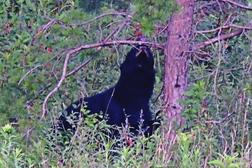 Picture care of Kimberly Russell- Taken at Cade's Cove Picture care of Kimberly Russell- Taken at Cade's Cove Last week I spent a few nights, with my son, at Cade's Cove. We tent camped, and hiked to Abram's Falls. Considering the theme for this month, it was very fitting. I saw deer, a tufted titmouse landed right next to me at camp, there were wild turkey, and a bear! It wasn't like the bear just came into camp, that was the deer. We were seeking her out. It was evening, and we heard where they liked to hang out in the cove. We simply went to those spots and eventually saw one about 100 yards away. My sister took the picture, and I asked to share it with y'all. The Middle Eastern Bear, historically. The Syrian brown bear is vulnerable on the endangered scale in most places in the middle east. It is extinct in Israel, Lebanon, and Syria. It prefers higher elevation, where there is tree cover and caves. It is believed these bears are descendants of the European brown bear. Biblical BearsBears are only mentioned, in some form, 12 times in the bible. I say "in some form" because I added Job talking about the bear constellation in the list. There are two bear Proverbs: Safer to meet a bear robbed of her cubs than fools in their folly. Proverbs 17:12 A wicked ruler over the poor is like a growling lion or a prowling bear. Proverbs 28:15 Dangerous Bears in the Bible:
The Mother Bear: There is something distinctive about the mother bear. It is intentionally brought up in scripture.
Come back on Sunday for a message on Elisha and the Bears!
21 So Balaam arose in the morning, saddled his donkey, and went with the officials of Moab. 22 Then God became angry because he went. So while he was riding on his donkey accompanied by his two servants, the Lord’s messenger stood in the road as his adversary. 23 The donkey saw the Lord’s messenger standing in the road with his sword drawn in his hand, so the donkey turned from the road and went into the field. Balaam struck the donkey in order to turn him back onto the road. 24 Then the Lord’s messenger stood in the narrow path between vineyards with a stone wall on each side. 25 When the donkey saw the Lord’s messenger, it leaned against the wall and squeezed Balaam’s foot against the wall, so he continued to beat it. 26 The Lord’s messenger persisted and crossed over and stood in a narrow place, where it wasn’t possible to turn either right or left. 27 The donkey saw the Lord’s messenger and lay down underneath Balaam. Balaam became angry and beat the donkey with the rod. 28 Then theLord opened the donkey’s mouth and it said to Balaam, “What have I done to you that you’ve beaten me these three times?” 29 Balaam said to the donkey, “Because you’ve tormented me. If I had a sword in my hand, I’d kill you now.” 30 The donkey said to Balaam, “Am I not your donkey, on whom you’ve often ridden to this day? Have I been in the habit of doing this to you?” Balaam said, “No.” 31 Then the Lord uncovered Balaam’s eyes, and Balaam saw the Lord’s messenger standing in the road with his sword drawn in his hand. Then he bowed low and worshipped. 32 The Lord’s messenger said to him, “Why have you beaten your donkey these three times? I’ve come out here as an adversary, because you took the road recklessly in front of me. 33 The donkey saw me and turned away from me these three times. If it hadn’t turned away from me, I would just now have killed you and let it live.” 34 Balaam said to the Lord’s messenger, “I’ve sinned, because I didn’t know that you were standing against me in the road. Now, if you think it’s wrong, I’ll go back.” 35 The Lord’s messenger said to Balaam, “Go with the men. But don’t say anything. Say only that which I tell you.” So Balaam went with Balak’s officials. Numbers 22:21-35 NRSV This month is all about animals. Last week we looked at the lions in the den. Next week we discuss the bears and the children. This week it’s all about the donkey. Donkeys were an important part to Middle Eastern culture. When they were domesticated in the fourth millennia BC, they changed the world, as we knew it. First, they were an easier animal to work with. More so than the cud chewing ox. The domesticated donkey meant more could be accomplished and, people could travel further. It was a beast of burden, but a steed of royalty. Let me recap the scripture, no there is too much, let me sum up: We have this story about this guy who just wants to get what’s his. The price is right, so he sets out on a quest for someone else. During his adventure he decides he is not going to work for the guy who hired him. Instead, he’s going to help the focus of the initial quest. Oh yeah, and there’s a talking donkey… and I’m not talking about the hit animated comedy Shrek. I’m talking about Balaam, the foreign prophet. It’s a story we are supposed to laugh at. A donkey sees God when Balaam can’t. Balaam punishes the donkey for saving his life. Ancient Near-East comedy at its best. After all, it’s not our prophet, so it’s OK to snicker. It’s part of the reason I’m drawn to him. It’s not like he chose to be born outside of Israel. God still called him. For goodness sake, why is no one laughing at Jonah? He thought he could run away from God and found himself in the belly of a big fish! Oh, it’s because he was an Israelite. That makes it unfortunate, and a good life lesson. Not something to laugh at. I’m drawn to this outsider because I feel I can relate. As a young child, my mother’s second husband brought domestic abuse, neglect, and verbal abuse. It would take years to deal with the damage it did to me. I was in seminary when I first understood it for what it was. I don’t care to talk about my past anymore, but I used to wave it like a flag. I used to think my past made me special, because it was the only time people paid attention to me. In truth, because I couldn’t see that my past broke me, I was unwilling and unable to heal. It left me unable to connect with people. In being broken, I had no place to talk, and nothing I could add to the conversation, until I was willing to admit I was broken. Then I had to piece myself back together first, before I shared my story. Now on the healthy side of life, I tend to see the person who sits on their own, or doesn’t connect as easily. I’m drawn to helping them relate to the group. I’m often frustrated when someone does something that ostracizes people, or how some seem to naturally get a pass because they were born to the right family or accepted by the right people. So, yeah, I’m naturally going to stick up for Balaam, the outsider prophet. Then there is the other side of the story. Last week I told you there was a time to stop talking. There are times when the best gift you can give someone, is the gift of presence and silence. Outside of crisis, there are also times to act, and open our mouths. I may have a soft spot for the outsider prophet Balaam, but this prophet was still about to go to Israel and throw down a curse. See, Balaam was not like the other prophets we read about in the bible. The other prophets get a message from God and share that message. Balaam, on the other hand, was a prophet for hire. He was known for his ability to throw out curses and blessings and have them stick. If we had read earlier in scripture, we would have learned King Balak was scared. He saw what the Israelites had done to his neighbor, the Amorites. He was afraid his land of Moab was next. He decided to call for Balaam. We don’t know how, but even with multiple warnings from God, Balaam eventually decides to take Balak’s money offer and go curse Israel. This is the story of the bad guy Balaam becoming a good guy. (Still sounds like Shrek, but let me continue.) We all know those people. They are the ones whose actions purposefully or inadvertently hurt those around them. Because the community is a system, ultimately the person endangering others gets hurt too. Balaam was headed down the wrong road, literally. It was going to lead to a whole heap of trouble. You know, when we are called to be quite, we are acting to not hurt the person in crisis. When we are called to open our mouth, we need to be prepared for repercussions. People want order and routine. It’s not that the order or the routine are correct. It’s just that we have this primal understanding to watch out for change. It comes from our caveman days. Movement in forest, bad. Our reflexes tells us to lash out at those things that are different, because that’s how life worked back then. More than likely those things were bad. Now, we react the same way when something different could actually be good, because it might be the routine or the order that has become corrupt. Truth hurts. It hurts the person hearing it, and it often hurts the person saying it. Truth hurts because we don’t want to hear we have been headed in the wrong direction. Balaam was headed in the wrong direction. He was warned, not once, but twice not to go curse Israel. His salvation came from one of the most unlikely of sources: His donkey. A few years ago I had an epiphany. It was during a nativity play and the director was casting for God. She cast this booming voice. Someone who spoke and everything he said just filled the room. It hit me. Every time I “hear” God in a play it’s this loud and terrible voice. Why do we do that? Does God come to you in a loud and booming voice? When God comes to me it’s usually in meek, and very unlikely places. For example, I was telling you how I was broken, and my realization I needed healing didn’t come until Seminary. Let me tell you about that moment. I had registered for a class on Moral Justice, Care, and Faith. It was a psychology class. I was told ahead of time there would be no theology or bible in this class. It was the truth. It was probably the only place where I didn’t walk in with my bible. There came a moment in the class where we were discussing the difference between introverts or extroverts. We were off topic. Y’all know who Dr. Jerry Gladson is? He’s an introvert, but he teaches classes at Columbia, and was the Senior Minister at First Marietta. I asked my professor about him. He’s very connected to those around him, for being an introvert. He said an introvert still connects with society, it just wears them out quicker. Without realizing it, I said, “I bet they struggle with conflict.” He responded, “You put an introvert’s back against the wall and they’ll act, and probably stronger than an extrovert.” To everyone else in that class, it was just an interesting moment. To me, in this quiet room, spoken by a soft voice, God had unlocked the truth. I grew up thinking I was an introvert. I thought I was an introvert because the thought of getting in front of a group of people seized me with fear. The thought of dealing with conflict stopped me in my tracks. I was not an introvert. I was a broken extrovert. It was my past that kept me from dealing with conflict in healthy ways. In a class where we were promised God was not going to be discussed, I had met with the divine. That’s what the donkey is for me. It’s not the bloggers who promise God in their advertising riddled pages. The ones who scream the truth laced in venom. Often times it’s not the obvious places. God is in the donkey, speaking in ways we, or often the person we are talking with, don’t expect. God is in the man in the wilderness, completely disconnected with the corrupted routine and order. God is the woman at the well, a second class citizen who brought her town to faith. God are the people who sat at the restaurant counter asking for equal treatment. God is Jesus on the cross being punished for speaking the truth. Being punished for trying to keep us from that danger. God is often not the booming voice, but the still small echo. The last voice we ever expect to fix our brokenness. To fix our unhealthy systems. Today I ask you to listen out for our unexpected God moments, and not to punish them when they come. I ask you to extend grace to those who do lash out at those unexpected voices. Like Balaam, they may not realize the dangers they are being moved away from. Mostly, I just ask you to realize that all have the ability to see the truth. Even when it seems we have to fall on the person to keep them from harm. Everyone has the ability to change for the better. In those moments, there God is also.
All this month we will be taking a closer look at some of the animals in the bible. From whales to bears, we will learn some interesting and important facts about these animals. TIL the most innocent swear word out there might just be jackass. Literally it means male donkey. I didn't realize, outside of pregnant dog, there was another animal centered obscenity. One for each gender, I suppose. The domesticated Donkey comes in over a hundred breeds all over the world. It's wild ancestor comes from Africa. It still exists today, but there are only 570 known to exist. It is very endangered. Historical Donkey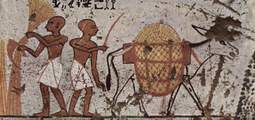 Donkeys were first domesticated around 3,000 BC. They were basically the next evolution in travel, and were used to help with the labor. Donkeys are also a historical paradox. They were considered draft animals, and sometimes they are symbolic of someone who is worked hard, like Issachar. They were also a symbol of royalty, as the more a person had the wealthier they were. Also, donkeys used for travel were not "saddled" as we traditionally understand it. The only object between the rider and the donkey was a cushion. Biblical Donkey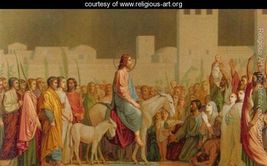 Donkeys were and are so prevalent in the middle east, we sneak them into scripture even when they are not mentioned. How many of you imagine Mary riding into Bethlehem on a donkey? Never mentioned. Not in one biblical story. There could have been a few donkey's taking Christ's family to Bethlehem, but we have no context from scripture. In God's whirlwind speech to Job, God uses the wild donkey to suggest God cares for creation even when it doesn't benefit humanity. In Zechariah 9:9 there is a prophecy that the new King of Jerusalem would ride into town on a Donkey, which is exactly what Jesus does. It's a fitting symbol, as Jesus is as paradoxical as the donkey.
16 Then the king gave the command, and Daniel was brought and thrown into the den of lions. The king said to Daniel, “May your God, whom you faithfully serve, deliver you!” 17 A stone was brought and laid on the mouth of the den, and the king sealed it with his own signet and with the signet of his lords, so that nothing might be changed concerning Daniel. 18 Then the king went to his palace and spent the night fasting; no food was brought to him, and sleep fled from him. 19 Then, at break of day, the king got up and hurried to the den of lions.20 When he came near the den where Daniel was, he cried out anxiously to Daniel, “O Daniel, servant of the living God, has your God whom you faithfully serve been able to deliver you from the lions?” 21 Daniel then said to the king, “O king, and live forever! 22 My God sent his angel and shut the lions’ mouths so that they would not hurt me, because I was found blameless before him; and also before you, O king, I have done no wrong.” 23 Then the king was exceedingly glad and commanded that Daniel be taken up out of the den. So Daniel was taken up out of the den, and no kind of harm was found on him, because he had trusted in his God. 24 The king gave a command, and those who had accused Daniel were brought and thrown into the den of lions—they, their children, and their wives. Before they reached the bottom of the den the lions overpowered them and broke all their bones in pieces. (Daniel 6:16-24 NRSV) Over the next three weeks I hope to share a view of God, and how we can live in the light of that view. I plan to do it through the lens of biblical animals. Now there are many animals that could have been the focus of this series. There are doves and dogs, goats and sheep, serpents and fish. Three weeks? We could spend three months talking about animals and the bible. I believe the three I have chosen help us understand God better. Today, the subject is lions. When we think biblical lions the first thing to come to mind should be strong and dangerous. This was a time period where the wilderness was free to roam. Lions attacked travelers. It was something that happened. We don’t hear about lion attacks in the Middle East today, because they were poached to extinction. Back then, they were commonplace. This is why it shouldn’t surprise you to hear lions are mentioned some 145 times. Just putting it out there, many scholars doubt this exact story actually happened. There are historical issues, and no written proof of a King Darius. What they don’t doubt, is someone could be thrown into a lion’s den and sealed up as punishment. Here’s the rub. I want to know what we can do with the text. I don’t want to stand in front of you and repeat over and over about our God being an awesomely strong God. Yeah, yeah, yeah, God is strong, but what do we do with that? I’m also not about to rehash the lesson we learned in Children’s Church. We’ve all heard it, “Do God’s will no matter what the consequences. We’re adults. We know sometimes doing the right thing means being put into the lion’s den and having the lions devour us. Martin Luther King, Jr. comes to mind. He did the right thing, and was assassinated doing it. Those early Christians who were martyred in coliseums comes to mind too. Christianity is right, but it’s rarely easy. Even Jesus warned us of the cost of following him saying, “See, I am sending you out like sheep into the midst of wolves; so be wise as serpents and innocent as doves. Beware of them, for they will hand you over to councils and flog you in their synagogues; and you will be dragged before governors and kings because of me, as a testimony to them and the Gentiles.” (Matt 10:16-18 NRSV) Only, what I just said doesn’t preach in relation to our Hebrew Bible scripture for today. Do the right thing no matter what the consequences? Daniel did the right thing, and it was relatively painless and easy. Actually, knowing Jesus’ words, it’s rather cruel to teach the classic “Daniel in the Lion’s Den” sermon. “Do God’s will and everything will be A-O-K!” “Oh, you were hurt doing God’s will? Are you sure you prayed hard enough?” I feel icky just saying it. That’s why I’m not going there. I’m going somewhere different. Somewhere unexpected. I’ve only been in ordained ministry for five and a half years. I personally have a hard time believing that. So much has happened in that short period of time. Seriously, just call me Abednego, because I’ve been thrown in the fire and tempered instead of burned. I know what it feels like to be in darkness and know God was with me. This isn’t about me. As diverse as the past five and a half years have been, I’ve heard the same story so many times. I’ve heard it in church. I’ve heard it from friends. I’ve heard it online. I’ve heard it so much I could share it with you now, and probably connect with at least a few of you. You might even think I’m telling your story even though we might never have shared a conversation. There comes a time, in quite a few people’s lives, where they find themselves in their own lion’s den. Maybe they lost their job, and they don’t know where their next meal is going to come from. Maybe they lost everything, and now they are on the street. Maybe they’ve become addicted to something they cannot let go of. Maybe they’ve been diagnosed with a serious illness. Or maybe, they lost someone close to them. Usually, at some point, all of us find ourselves there. We never ask to be put in that metaphorical den, but somehow or another, we find ourselves there, sealed in. Today I’m not going to tell you to be Daniel. When we are in those positions we have no other choice but to be Daniel. I am telling you to be something though. When you see someone in their own den, we must be the lions. Let me explain. In the book of Job, Job was blameless. He lost almost everything. He lost his property. He lost his health. He lost all of his children. In the way of his people, he mourned. He sat an ash heap, and put on sackcloth. His friends sat with him. He sat in silence for maybe weeks. When he finally talked, he cried out to God to explain why he was going through such torment. Rule number one, when dealing with a person in crisis, they are going to cry out. They are going to say things they may or may not believe because they are in pain. Think of a wounded animal. If you touch them, will they not bite out at you? It’s a defense mechanism. We should never be angry when people yelp or bite in their own pain. Rule number two, theology does not belong in the midst of crisis. Theology can be discussed when both parties are level headed. No one in crisis can look at issues with clarity. People need time and space. What did those friends do? They spent most of the book chastising Job. Basically one said, “Well, maybe you didn’t realize what you did wrong, but you did something wrong to cause this misfortune upon you.” Another said, “Stop saying that God is wrong! That’s impossible.” Then the third: “Just ask for forgiveness and move on. Things will get better.” When God finally comes and talks to Job, Job is indeed blameless. You know who isn’t? The friends. In the end, Job has to make sacrifices to redeem the friends. I believe, their failure to understand a person in crisis was their sin. Which gets me back to the lions. There is little we can do when we are the ones in crisis, when we are Daniel. When we are the one around the person in crisis, when we are the lions, God often calls us to shut our mouth. Yeah, there are actions that need to be taken to help a person in crisis. Most of us are not the angels in the room qualified to give it. We are the lions, and even if our nature is to lie with the calf, our mouth is a powerful and dangerous weapon. Our actions and words have the ability to destroy someone who is already in darkness. I've often prayed for God to show me how to act. In 5 ½ years I learned a new prayer, for God to show me when to leave something alone. I’ve learned, when sitting with someone in that den, sometimes the best gift is silence and presence. It’s in letting God act in as much in your non-action as your action, we can find God in that darkness.
All this month we will be taking a closer look at some of the animals in the bible. From whales to bears, we will learn some interesting and important facts about these animals. 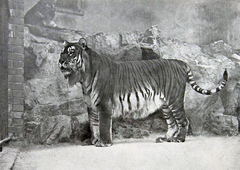 Lions, and Tigers and Bears, oh, my! While you will never see lions and tigers in a European forest, there was a time when all three roamed in the Middle East. (Considering Oz was a strange and marvelous place surrounded by desert, it kinda makes you wonder if Dorothy was really dropped into the Middle East.) Of the three animals, only the bear can still be found in the area. The Caspian tiger became extinct in the late 1960's. As the bible mentions nothing about any tiger, we will not be discussing them. Lions, however, are mentioned more than a few times. Historic Lions: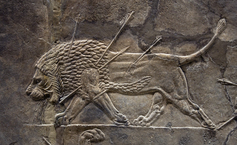 With all the lions in the bible, where did they go? We've all heard of African Lions. We know how dangerous they are. Well, from texts and images, like the one to the left, we've learned they were heavily poached by the royalty of the time. In fact, the only place this animal exists today is in a small pocket in Asia. They have been completely wiped out of the Middle East. These lions also look a little different than their African counterparts. First of all, their mane is thinner while their coat is thicker. Secondly, the tassel on their tail is thicker. They are the same in their general demeanor. These animals were strong and dangerous. Biblical Lions:Lions are all over the place in the bible. New Testament. Hebrew bible. Allegory. History. I want to hit upon some major themes surrounding this beast. If I don't hit on a big one you know, perhaps it will come back on Sunday when I share my Lion sermon. Attacking Lion: When a lion attacks in scripture, it usually means death will soon follow. It could be the lion, or it might be the person being attacked. Sometimes the person being attacked overcomes the lion: The fighter of Kabzeel: "Benaiah son of Jehoiada, a valiant fighter from Kabzeel, performed great exploits. He struck down Moab's two mightiest warriors. He also went down into a pit on a snowy day and killed a lion." (2 Sam 23:20 NIV) David, King of Israel: "But David said to Saul, “Your servant has been keeping his father’s sheep. When a lion or a bear came and carried off a sheep from the flock, I went after it, struck it and rescued the sheep from its mouth. When it turned on me, I seized it by its hair, struck it and killed it. Your servant has killed both the lion and the bear; this uncircumcised Philistine will be like one of them, because he has defied the armies of the living God." (1 Sam 17:34-36 NIV) The action of Samson: "The Spirit of the Lord came powerfully upon him so that he tore the lion apart with his bare hands as he might have torn a young goat. But he told neither his father nor his mother what he had done." (Judges 14:6) Sometimes the lion wins the battle: At defying God's words a man from Judah is torn apart by a lion: "When the man of God had finished eating and drinking, the prophet who had brought him back saddled his donkey for him. As he went on his way, a lion met him on the road and killed him, and his body was left lying on the road, with both the donkey and the lion standing beside it. Some people who passed by saw the body lying there, with the lion standing beside the body, and they went and reported it in the city where the old prophet lived." (1 Kings 13:23-25 NIV) Historic Lion: While the scripture doesn't mention it, we know lions, among other deadly animals, were used in the coliseum to kill early Christians. Probably the reason these stories don't make into our biblical narrative is because, they happened rather late, but also over the subtext to being destroyed or overcoming a lion. If the bible story has the person overcome the lion, they are favored in God's eyes. If the story has the person devoured by the lion, they have lost favor in God's eyes. Those who died in the coliseums were in a situation where they were raised up as martyrs, favored by God. Yet, they still suffered death at the jaws of the lion. In a way, it is almost respectful not to have their story shared biblically. Symbolic Lion: Isaiah has a couple of symbolic images of lions worthy of our attention. In both places it shows peace as a lion acting outside its natural behavior. There are lions lying with calves, (Isaiah 11:6). There are also an image of a lion choosing to eat straw, (Isaiah 65:25). It's a beautiful image of peace, where that which is dangerous chooses not be dangerous anymore. Dead Lion: Sampson, having killed a lion, leaves it. A while later he finds it and bees had made a beehive inside of it. Being a Nazarite, eating wild honey from a dead animal was a big no-no. He does it anyway. While this incident doesn't take Sampson's power, it does show how disconnected from God Sampson has become. Sampson killed the lion, but would eventually die to be in God's good will again. Join me Sunday afternoon as I deal with Daniel and the Lion's Den! See you then.
I’m probably in the minority in thinking this, but I think whales are the scariest creatures on the face of the earth. They’re huge. They’re scary. We’re so small in comparison, that they could kill you on accident, and probably not even know they killed you. If the movie Pinocchio teaches us anything, it’s that whales have no regard for human, or wooden, or cricket life. Which is why it’s so strange that the whale is the good guy in the book of Jonah. We don’t usually talk about Jonah in terms of the whale. The whale seems kind of incidental to the overall story. He’s swallowed by a whale because he ran from God. God could have just as easily used some other animal or force of nature to get Jonah to go to Ninevah. But God didn’t. He appointed the whale. And that’s actually what the whole book of Jonah is about. The book of Jonah is a series of divine appointments: · God appoints Jonah to go to Nineveh to preach against it. (1:2) · God appoints a whale to swallow Jonah when Jonah doesn’t listen. (1:17) · God appoints Jonah to go to Nineveh again. (3:2) · God appoints a plant to protect Jonah from the sun (4:6) · God appoints a worm to kill the plant (4:7) · God appoints a hot eastern wind to make Jonah miserable (4:8) What is interesting about the story of Jonah is that of all the appointments that God makes, Jonah is the only one who rejects his appointment. Only Jonah says, “Forget that. I’m doing my thing.” Which is what makes the whale the good guy. Not counting the Jonah and Pinocchio stories, humans don’t tend to be a part of the typical diet of whales. But God had the whale swallow Jonah anyway. And the whale listened. He swallowed Jonah up because that’s what God sent him to do. Do you think the whale knew anything about the Ninevites? I somehow doubt it. He probably doesn’t know anything other than that he just ate a really weird looking fish. He was swimming along, minding his own business, when God sent him to swallow a Jonah. So he did it. And a few days later, God then had the whale throw Jonah back up and he did that to. Really, probably none of the things God appointed in the book of Jonah knew what they were doing. They just knew that God had sent them to do something, and they did it. The whale probably had no idea who the Ninevites were. The plant probably didn’t know it was protecting anyone. The worm probably didn’t know someone was sitting under the plant he was eating. The wind probably had no idea who Jonah was. That’s not the important part. The important thing is that a whale helped reconcile the Ninevites to God without even knowing who the Ninevites were. And if God used a whale to reconcile the Ninevites, you have to wonder how God might use you in ways you don’t even know. You may experience hardships that make no sense to you, but that God is using to impact his kingdom in ways you’ll never ever hear about. That doesn’t mean that all bad things are planned and approved of by God. It doesn’t mean that every hardship and bad situation is all just a part of God’s master plan. God probably didn’t plan on Jonah running away. But the story of the whale shows us that God is capable of using you in your situation in ways you’d never have thought possible. We may never know the impact that our lives will have in the kingdom of God, but we can read stories like Jonah and know that whatever happens, our God is in control. We can respond to our situations like Jonah, rejecting what God is trying to do in us, or we can respond like the whale, or the plant, or the worm, or the wind, and let God do his work in us. May we rejoice that we serve a God who reconciles creation to himself. And may we strive to join God in that plan, even if we can’t see the larger picture. - - - Tyler is a youth minister at a Church of Christ in Texas. He enjoys hanging out with his wife, rock climbing, and writing about himself in the third person. He writes a weekly blog at tylerjarvis.wordpress.com, and you can follow him on Twitter at @tyler_jarvis.
|
Categories
All
Archives
October 2023
|


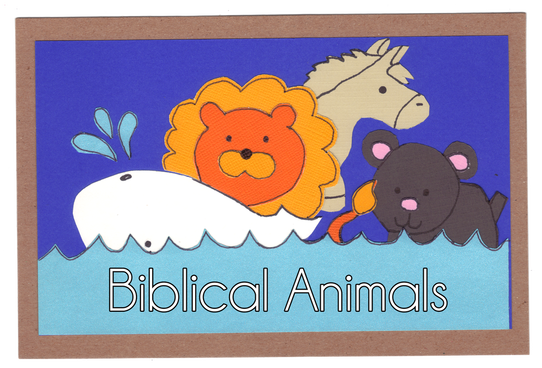
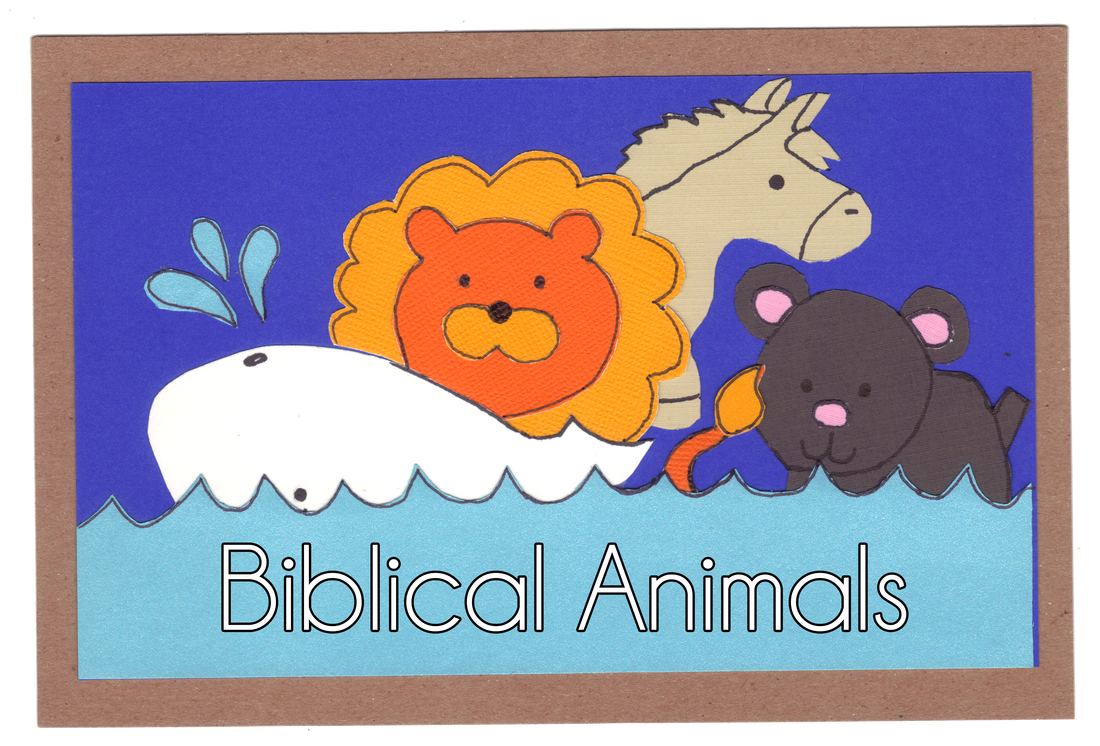
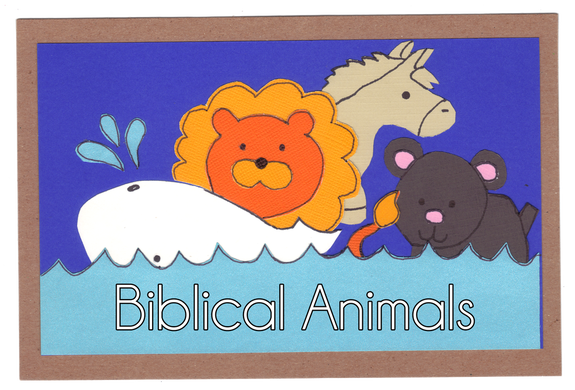

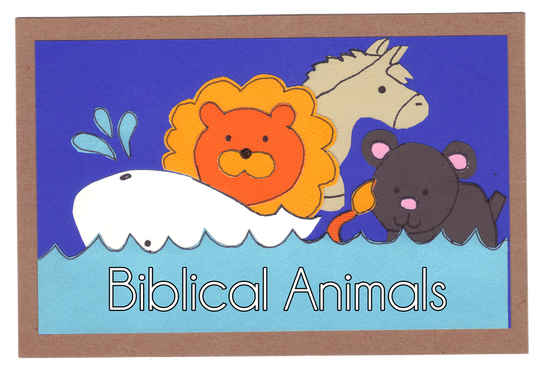
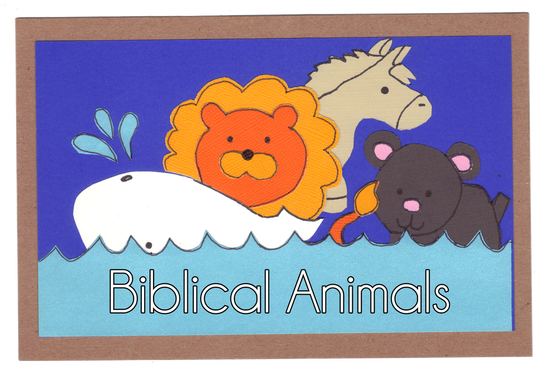
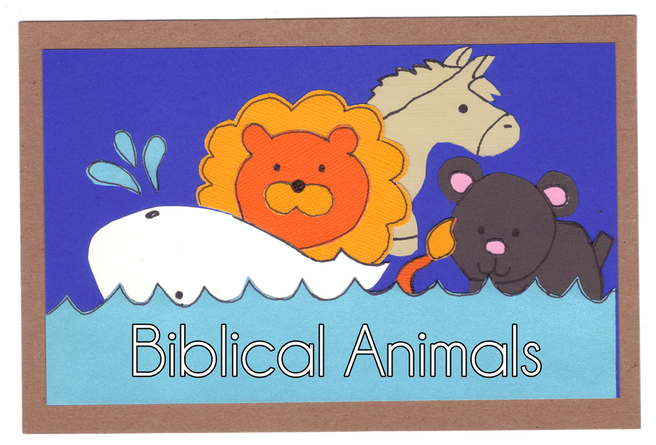
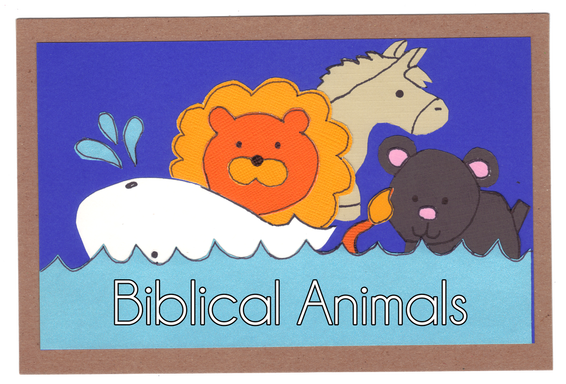

 RSS Feed
RSS Feed